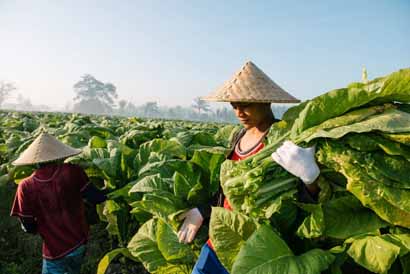Cambodia’s Ministry of Health will soon start fining people who smoke in public venues where tobacco smoking is banned, along with the owners of those venues, according to a story in The Khmer Times.
Ing Phirun, secretary of state at the Ministry of Health and permanent vice-chairman of the Tobacco Products Control Commission was quoted as saying that the ministries of health and justice would collaborate to fine those who violated rules against tobacco smoking in public areas such as restaurants and hotels.
“We have an inspection working group of more than 500 people to work on the sub-decree, and anyone who smokes in a prohibited area will be fined 20,000 riel [US$5] per time,” he said. “Moreover, if they are found smoking in a hotel or restaurant, the fine will be doubled for the owners of the premises.”
The government sub-decree banning smoking in workplaces and public places came into force in March 2016.
The sub-decree says public places refer to restaurants, workplaces, public institutions, hospitals, schools and public parks.
Fines of 20,000 to 50,000 riel will apply respectively to anyone who smokes in public and to venue owners who do not display notices drawing attention to the prohibition on smoking within their premises.
Tag: Cambodia

Fines threatened

Factory shut down
A cigarette-manufacturing factory in the Tbong Khmum province of Cambodia was ordered on Tuesday to cease production because it was not including health warnings on its packs, according to a story in The Khmer Times.
Interior Ministry representatives together with court and local officials, shut down production and seized more than 1,600 non-compliant packs.
Hak Siek Lim, a Tbong Khmum Provincial Court spokesman, said production would not be allowed to restart until the company operating the factory, CTK Co. Ltd, was able to fulfil its obligations.
Dr. Mom Kong, executive director of the Cambodia Movement for Health, which pushed for the health warnings on cigarette packs, said that compliance was better among companies that sold cigarettes domestically and overseas.
Companies that sold mostly on the domestic market were more reluctant to warn the public about the dangers of smoking.
According to a National Center for Health Promotion report published last year, there were 1.68 million cigarette smokers in Cambodia.
In June, Health Minister Mam Bunheng said tobacco use was an obstacle to achieving the UN Sustainable Development Goals, since it harmed public health, the economy and the environment.
“The Health Ministry wants to introduce a ban on smoking at work and in public places, prohibit tobacco advertising, and stop sponsorship and promotions by tobacco manufacturers,” he said.
Bunheng added that Ministry officials wanted also to strengthen warnings and images printed on tobacco product packaging and expand public health campaigns discouraging smoking.
Itching to fine smokers
Cambodia is among the highest achieving countries in the Western Pacific Region in respect of having in place laws to protect people from tobacco smoke, according to a story in The Phnom Penh Post citing the World Health Organization (WHO) Report on the Global Tobacco Epidemic.
Where the country falls down is in respect of enforcing those laws. The Post’s story quoted an official at the National Centre for Health Promotion (NCHP) as saying that no fines had been issued for violations of tobacco regulations.
Mom Kong, executive director of the Cambodia Movement for Health, said the government had been gradually implementing provisions of the 2015 Law on Tobacco Control and a 2016 sub-decree prohibiting smoking in public places.
But he said it was time to move beyond dissemination and education and into enforcement.
“I think it’s time for the government to take another step,” he said. “Everyone wants to see the violators get fined.”
Meanwhile, Dr. Yel Daravuth, who heads the WHO’s Tobacco Free Initiative in Cambodia, said compliance with regulations governing graphic health warnings on cigarette packs had reached 70 percent, not 100 percent.
“We want to see the fines take place soon so [the regulations] can be more effective,” he said.
Ray Rany, head of the tobacco and health office at the NCHP, acknowledged that no fines had yet been issued.
“I can’t tell exactly when the fining will take place,” she said. “But it could be soon.”

Same low prices
While it has been more than six months since Vietnam agreed to waive import duties on 3,000 tons of Cambodian exports of unmanufactured tobacco, smallholder tobacco growers claim the agreement has done little to improve their incomes, according to a story in The Phnom Penh Post
Some growers have accused big tobacco companies of hoarding all the profits from these transactions.
The tobacco-duty exemption came as part of a bilateral trade agreement signed in October that gave preferential treatment to 39 export items from Cambodia and 29 items from Vietnam. Under the deal, Cambodian tobacco producers could apply for licenses to export up to 3,000 tons of unmanufactured tobacco a year to Vietnam duty-free in 2016 and 2017.
The agreement was widely expected to stimulate exports, with smallholder farmers benefiting from higher prices created by the demand from traders looking to fill the quota.
However, Som Ra, head of the Krouch Chhmar district agricultural office in Tbong Khmum province, said tobacco prices had remained stable since the quota deal, and he questioned whether anybody had actually benefitted from it.
“If a deal for 3,000 tons to Vietnam existed, I would expect prices to rise and more competition in the market, but so far nothing has changed from the Vietnamese side,” he said.
He added that most tobacco farmers in his district were selling their tobacco to British American Tobacco (BAT) or Chinese dealers.
Meanwhile, Chhin Buntheourn, a smallholder tobacco farmer in the Kong Meas district of Kampong Cham province, said he was disappointed that the quota deal had done little to improve his income.
“I initially expected that the price of tobacco would increase, but until now we continue to struggle with the same low price,” he said, adding that the market rate for tobacco had remained unchanged at between 300 and 400 riel per kg.
Buntheourn said he suspected that large tobacco firms had obtained the export permits but were not passing along any of the profits to smallholder farmers.
“The bilateral agreement only benefits the big companies and has not offered any better price for us,” he said.
Chhay Sokhon, who cultivates tobacco on his 2.5 ha farm in Krouch Chhmar district in Tbong Khmum province, expressed a similar sentiment, adding that market prices were dictated by “smooth-talking traders”.
“When I heard the news I expected that I would receive a good price this year for my crop, but nothing has changed,” he said. “Any fluctuation in the price is the result of bargaining.”
Kim Sarourn, director of Kampong Cham’s Provincial Agriculture Department, said farmers saw better yields this year, but that the agreement had done little to open new markets.
“I haven’t heard of any new markets,” he said. “Demand from the Vietnamese side remains the same and there is really only BAT contracting with farmers.”
Almost all tobacco grown in Cambodia is cultivated in the adjacent provinces of Kampong Cham and Tbong Khmum.
The provinces have about 5,000 ha and 1,000 ha of tobacco under cultivation, respectively, yielding on average 1.5 tons per ha.
Cambodian manufacturer breaks with Imperial
 Usine de Tabac du Cambodge has severed ties with Imperial Brands, ending a three-year business relationship, reports The Phnom Penh Post.
Usine de Tabac du Cambodge has severed ties with Imperial Brands, ending a three-year business relationship, reports The Phnom Penh Post.The Cambodian company manufactured Imperial’s Fine brand in Cambodia. Production will now be fully handled by Imperial Tobacco’s Huotraco International subsidiary.
Guillaume Dubois, market manager for Huotraco, said that the end of the partnership with UTC would not hamper the brand name or disrupt availability of the product.
“This will not affect the quality level of Fine cigarettes in Cambodia,” he said, noting that Imperial Tobacco, which is the fourth-largest tobacco company in the world, had a sizeable market share in the Kingdom.
Imperial “will continue to operate in Cambodia as before and there is no change in our strategy to continue to invest in Cambodia to develop our brands,” he said.
Huotraco also distributes other Imperial tobacco products such as Gauloises, Davidoff, West, Gitanes, L&B, Rizla and Drum.
Photo by DeeMakMak



Export opportunities welcomed


Photo by Daniel Gorecki 


Cambodia’s Ministry of Commerce is calling on unmanufactured-tobacco dealers to apply for licenses to export their tobacco to Vietnam, according to a story in The Khmer Times.
Vietnam agreed in October to waive all duties on annual imports of 3,000 tons of unmanufactured tobacco from Cambodia.
The tobacco duty waiver was part of the Bilateral Trade Enhancement Arrangement under which Cambodia received from Vietnam a preferential zero tariff on 39 products.
The agreement between Cambodia and Vietnam was signed several years ago and has been renewed every two years, according to ministry spokeswoman Soeung Sophary.
Heng Piseth, provincial director of the Tbong Khmum agricultural department, was said to have told the Khmer Times that the duty waiver was good news for tobacco farmers, as well as for merchants and exporters because the tobacco market was uncertain and farmers were worried.
“The market for tobacco is not good and depends very much on merchants. However, if there is a certain market from Vietnam that lets us have a chance to export, then tobacco farmers can survive,” said Piseth.
“They would not have to worry about the market anymore,” he added.
Tobacco farms are said to take up about 1,000 ha of land in Tbong Khmum province.





